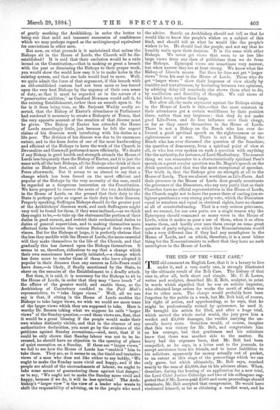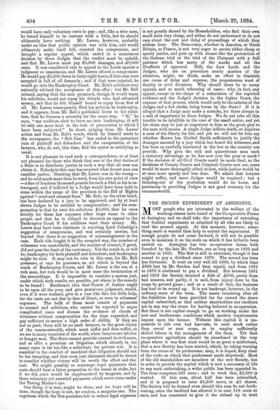THE END OF THE "BELT CASE."
THE old comment on English Law, that it is a luxury to live under it, and a very costly one, is strongly illustrated by the ultimate result of the Belt Case. The history of that case is, after all, both short and simple. Mr. C. B. Lewes, writer and sculptor, described Mr. R. Belt, sculptor, in print in words which signified that he was an artistic impostor, who obtained large orders for works the merit of which was due to other men. The charge would probably have been forgotten by the public in a week, but Mr. Belt had, of course, his right of action, and apprehending, as he says, that he might be professionally ruined by quiescence, he used it. He brought his action for libel, and after a huge trial, which moved the whole social world, the jury gave him a verdict and £5,000 damages, the verdict carrying the un- usually heavy costs. Outsiders would, of course, imagine that this was victory for Mr. Belt, and congratulate him on his courage, but that gentleman and his solicitors knew that there was another side to the matter. So heavy had the expenses been, that Mr. Belt had been compelled, as he says, in a letter sent to the journals, to accept assistance from his friends, and to incur liabilities to his solicitors, apparently for money actually out of pocket, to an extent at this stage of the proceedings which we can only guess, but which ultimately, Mr. Belt says, reached nearly to the sum of £5,000, due to his advisers alone. When, therefore, during the hearing of an application for a new trial, the Lord Chief Justice Coleridge and two of his colleagues sug- gested that if Mr. Lawes paid £500 and costs proceedings should terminate, Mr. Belt accepted that compromise. He would have vindicated himself, as far as obtaining a verdict went, and he would have only voluntary costs to pay ; and, like a wise man, he forced himself to be content with a little, lest he should ultimately have nothing. Mr. Lawes, however, probably under an idea that public opinion was with him, and would ultimately make itself felt, rejected the compromise, and brought a regular appeal, which ended in a unanimous decision by three Judges that the verdict must be upheld, and that Mr. Lawes must pay £5,000 damages, and £9,000 costs. It was considered vain to appeal to the Lords against a judgment so unanimous, and Mr. Lawes offered a compromise. He would pay 15,000 down in forty-eight hours,if that sum were accepted in full of all demands ; and if that were rejected, he would go into the Bankruptcy Court. Mr. Belt's solicitors very naturally advised the acceptance of this offer ; but Mr. Belt refused, saying that the sum promised, though it would repay his solicitors, would not repay his friends who had advanced money, and that he felt himself bound to repay them first of all. Mr. Lewes consequently filed his petition in bankruptcy, and it appears, from Mr. Belt's published letter to his solici- tors, that he foresees a necessity for the same step. "if," he says, "my creditors elect to force me into bankruptcy, it will be only one more knot in the lash of persecution to which I have been subjected." In short, judging from Mr. Lewes' action and from Mr. Belt's words, which he himself sends to the newspapers, the "Belt Case" has ended in the pecuniary ruin of plaintiff and defendant and the exasperation of the lawyers, who do not, this time, find the oyster as satisfying as usual.
It is not pleasant to read such a correspondence, or at least not pleasant for those who think that one of the first duties of a State is to distribute justice in such a way that all men can obtain it. Nobody in this case has received what decent men can consider justice. Granting that Mr. Lewes was in the wrong— and he said much more than he need, from his own point of view —a fine of fourteen thousand pounds for such a libel as his is ex- travagant, and if inflicted by a Judge would have been held to come within the range of the provision in the Bill of Rights against" cruel and unusual fines." Mr. Belt, on the other hand, has been declared by a jury to be aggrieved, and by at least eleven Judges to be entitled to compensation ; and his com- pensation is that he owes his solicitors £5,000, that he owes strictly for these law expenses other large sums to other people, and that he is obliged to threaten an appeal to the Bankruptcy Court if his creditors want their money. Mr. Lawes may have been obstinate in rejecting Lord Coleridge's suggestion of compromise, and was certainly unwise, but beyond that there is no suggestion of mismanagement in the case. Each side fought it in the accepted way, the number of witnesses was unavoidable, and the number of counsel, if great, did not pass the limit of the customary. Yet the result is, or will be, bankruptcy for both plaintiff and defendant, and bankruptcy might be rain. It may not be ruin in this case, for Mr. Belt possesses, or says he possesses, an art which is beyond the reach of Bankruptcy Courts, and Mr. Lewes is the son of a rich man, but ruin would be in most cases the termination of the proceedings. It is impossible to consider a system just, under which such results are possible, yet where is the remedy to be found? Bentham's idea that Courts of Justice ought to be open all the year, and give gratuitous judgment, would, even if it were realised, give in a case like this but little help, for the costs are not due to fees of Court, or even to witnesses' expenses. The bulk of them must consist of payments to counsel and solicitors, who cannot be expected to argue complicated cases and discuss the evidence of clouds of witnesses without compensation for the time expended, and pay sufficient to secure a high order of ability. If they are not so paid, there will be no such lawyers, to the great injury of the commonwealth, which must suffer and does suffer, as we see in many countries of the world, when lawyers are inferior or hungry men. The State cannot provide counsel in civil cases, and so offer a premium on litigation, which already in too many cases is far too like a substitute for private war. It is essential to the comfort of mankind that litigation should not be too tempting, and that even just claimants should be forced to consider whether victory will be worth the effort and the cost. We might possibly so rearrange legal payments that costs should bear a fairer proportion to the issues at stake, but if we did, costs would be supplemented by bargains, and by those voluntary yet essential payments which never come under the Taxing Master's eye. One thing, it is true, might be done, and we hope will be done, though the hope is not, we confess, a sanguine one. The eagerness which the Ten-pounders felt to reduce legal expenses
is not greatly shared by the Hoaseholders, who find their own small suits very cheap, and either do not understand or do not care about the cost and delay of proceedings of which they seldom hear. The Democracy, whether in America, or Great Britain, or France, is not very eager to secure either cheap or speedy justice, and puts up with abuses like the protraction of the Guiteau trial or the trial of the Claimant with a dull patience which has many of the marks and all the ill-effects of approval. Still, the Law Lords and the Judges, who are on procedure nearly masters of the situation, might, we think, make an effort to diminish one cause of delay and expense, the preposterous want of finality in civil decisions. Why should there be so many appeals, and so much rehearing of gases; why, in fact, any appeal, except in the shape of a submission of the reported evidence and the Judge's decision to the higher Court, the expense of that process, which would only be the salaries of the Judges and a few clerks, being borne by the State If it is alleged that a Judge may make a mistake, let there always in a suit of importance be three Judges. We do not take all this trouble to be infallible in the case of the small suitor, and yet his claim may be just as important to him as the great plea to the man with means. A single Judge inflicts death, or deprives a man of his liberty for life, and yet we will not let him say whether Brown has libelled Smith sufficiently to justify the damages assessed by a jury which has heard the witnesses, and has been as carefully instructed in the law as the country can provide. Why give the rich and quarrelsome man each a statutory advantage as he has now over the poor or meek ? If the decision of all Civil Courts could be made final, as the decisions of County Courts and Criminal Courts now are, eases would be more thoroughly sifted at first, while justice would be at once more speedy and less dear. We admit that lawyers might suffer, and more Judges would be required ; but a thinning-out of the profession would do no harm, and parsimony in providing Judges is not good economy for the commonwealth.



































 Previous page
Previous page